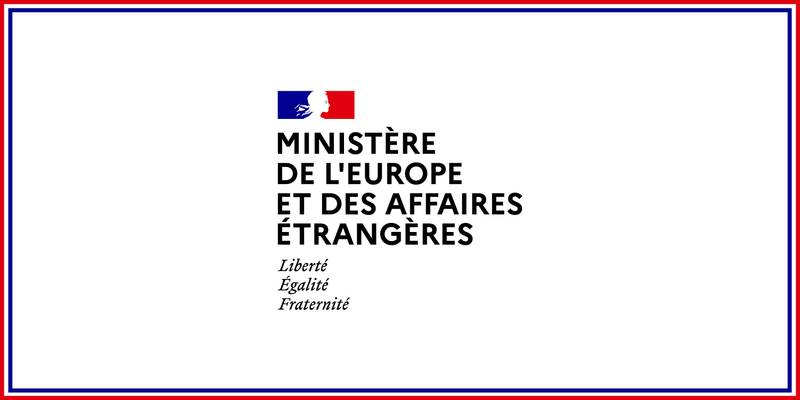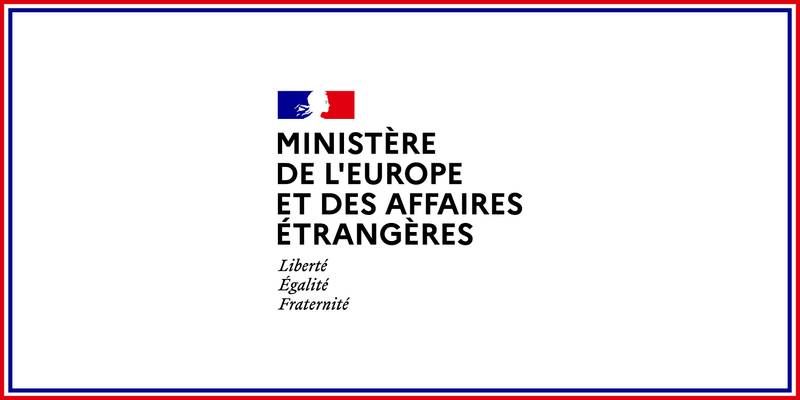Joint Statement by Foreign Affairs Ministers of France, Germany and Poland
Our security is under threat. We live in an age of systemic rivalry in which certain autocratic regimes are using their power to undermine and destroy the international order that is based on the Charter of the United Nations. Russia is waging an illegal war of aggression against one of our neighbours, is openly rejecting and actively undermining the European security architecture and has already engaged in malign and hybrid operations against our countries. As Europeans, we must stand together and protect our interests and values as well as the principles of international law, human rights and peace.
The European Union must become a true geopolitical actor and security provider, able to respond to today’s security challenges and strengthen the international order. We, the Ministers of Foreign Affairs of France, Germany and Poland reaffirm our determination to promote an ambitious agenda for Europe. It is our goal to strengthen European sovereignty and resilience.
To that end, we have agreed on the following “Weimar agenda for a strong geopolitical EU”. It reflects our priorities for the upcoming new European term in the area of EU external action. We hope to give impetus to our upcoming strategic discussions on the future of the EU in the world.
Strengthening European Security and Defence
- We reaffirm the importance of stronger and more capable European defence capabilities that contribute positively to global and transatlantic security, and are complementary to and interoperable with NATO. In this regard, we underline the importance of a strong European pillar within NATO for maintaining and strengthening our collective defense and security as Allies. We consider the following elements the cornerstones for strengthening European security and defence:
-
- Boosting European resources: We will be spending a minimum of 2% of GDP on defence. At the European level, we are looking forward to the report to the June European Council exploring all options for mobilising funding. We need to spend our funds strategically – in order to develop the forces and capabilities we need for collective defence.
-
- Closing European capability gaps is the way forward: The greatest need for European build-up is in the spheres of air defence, land combat capabilities, deep precision strike systems, drones, command and control capabilities, mobility and logistic capabilities, ammunition stocks as well as investments in future technologies to maintain a technological advantage.
-
- Industrial ramp-up: Prioritizing defence industrial policy through more coordination and standardisation, extension of production capacities and investments, long-term purchasing contracts, adequate support for the EDF and EDIP, bridging the financing gaps between the R/D phase for prototypes and market readiness, thus ensuring that these efforts lead to broadening of the production base across the EU and benefit industries, including SMEs and mid-caps companies, in Europe. Improving European defence industry’s access to public and private finance.
-
- Joint European capability development and procurement: Lower costs and better interoperability through more framework agreements, additional procurement coalitions and joint certification. Multi-year purchase guarantees by governments to provide planning security and incentives for expanding production.
-
- Greater effectiveness in crisis management: We must ensure more effectiveness of our CSDP, including more efficient decision-making, and the operational readiness of the “EU Rapid Deployment Capacity” by 2025.
- Counter foreign information manipulation and interference and, recalling the Statement by the Ministers for European Affairs of France, Germany and Poland and other EU Member States of 21 May 2024, enhance resilience and work towards further EU coordination and an active response, especially with a view to ensuring swifter and more effective actions from online platforms to combat disinformation campaigns, as well as by fostering work by civil society to strengthen media literacy and resilience in third countries. We plan to set up a common fund to finance media resilience projects abroad.
- Ensure long-term European commitment to Ukraine in the areas of the military, the economy and diplomacy and building on the planned EU-Ukraine security arrangement and work undertaken in the Ukraine Defense Contact Group (Ramstein) and other fora, including the Paris conference on Ukraine of 26 February. Supporting Ukraine means strengthening our own European security and promoting our geopolitical interests. We stay united in ensuring military support to Ukraine for as long as it takes. We will be working together and with Ukraine towards the June European Council, the NATO Summit in Washington and the meeting of the European Political Community in Blenheim in July. Our Weimar Triangle meeting with Ukraine and the Ukraine Recovery Conference in Berlin in June will be useful steps in this direction. Also, the Weimar Triangle countries envision a joint diplomatic outreach on behalf of Ukraine into international partners.
- Ensure a successful enlargement process with Ukraine and Moldova that contributes to enhance Europe’s stability and security. This requires an accession process based on merits, and strong support to Ukraine and Moldova’s efforts to progress on their reforms and to meet the necessary criteria in order to launch the EU accession negotiations by the end of the Belgian Council presidency and then opening the fundamentals’ negotiating cluster with both countries. All of this would be complemented by the efforts made under the framework of the “Berlin Process” for the Western Balkans.
- Committing ourselves to strengthening Moldova’s security and defence sector, its resilience against foreign interference, to supporting Moldova’s struggle against Russian hybrid offensive as well as to advancing necessary reforms, building notably on the meeting in Paris on Moldova’s security of 17 May. Weimar Triangle countries will also help mobilise available EU funds for local initiatives focusing on development aid, promotion of the EU, combating disinformation, and countering narratives.
- Support Ukraine’s recovery, reconstruction and modernisation: The Weimar Triangle will strive to identify possible joint projects for Ukraine. One of the possible areas of common action could be strengthening of the Ukraine’s administrative capacity (exchange of staff, training programmes, know-how transfer). This should support the efficiency of the reconstruction and maintain the momentum of the accession process while helping Weimar Triangle to better understand Ukraine’s needs.
Improving coherence in EU external action: Speaking and acting as one
As we prepare for the next European cycle, we need to strengthen the efficacy of external action. We are looking forward to the appointment of a strong leadership team regarding the European Commission, the High Representative/Vice President of the Commission and the President of the European Council following the European Elections, with the aim to further strengthen coherence between EEAS, the Commission and the Council Secretariat and with due account of geographical and demographic diversity of the Union and its Member States. A “Team Europe” approach should be pursued between EU Institutions and EU Member States to ensure coherence in action and messaging. This is all the more necessary that the EU is expected to help the European security and defence industry scale up in the next few years. We will be coordinating closely on the institutional requirements to sustain this effort. Similarly, we believe that the next Commission’s agenda on economic security and resilience is pivotal to build a sovereign and competitive EU.
We also plan to:
- Explore the idea of an integrated EEAS/Commission sanction team acting as a single EU point of contact for sanctions, for common analysis on both the impact of sanctions and sanction circumvention, and as a service provider to Member States when proposing listings or sectorial sanctions. Such an integrated team would contribute to a more robust sanctions policy, in line with our CFSP objectives.
- Explore how the High Representative/Vice-President of the Commission could be strengthened with the aim of ensuring the coherence and efficacy of external action. The HR/VP should also improve the impact of Global Gateway as a geopolitical tool. This should also ensure a more coherent and more strategic use of EU external financial instruments.
- Put into place a “Weimar Reflection Process” on external relations, to start a discussion on more long-term reforms, including on streamlining decision-making in CFSP in an enlarged Union and bringing together more closely policy and means in external action. The Reflection Process could thereby also contribute to a review of the 2016 EU Global Strategy in view of the changed geopolitical environment. One element could be a mix of high-level (former) civil servants and renowned experts.
- Work towards an approach of “Integrated security for the EU”: As hybrid, cyber and terrorist threats, foreign information manipulation and interference, as well as corruption and transnational organised crime have an impact on external action and domestic policies, we commit to better reflecting the nexus between internal and external security in our external action.
Strengthening global outreach: next steps and support of global public goods
- Climate action: We must continue to enhance European security and prosperity also through turning the EU into a stronghold for green innovation and investment, phasing out the EU’s dependence on Russian fossil fuels, increasing our resilience to climate impacts and ensuring to keep the global positioning for an ambitious, achievable, fair, just, inclusive and 1.5 C aligned climate policy.
- We will put in place a “Green Weimar Triangle” to support third Parties in implementing the first Global Stocktake decision, including the call to achieve a just and orderly transition away from fossil fuels, triple renewable energy capacity and double the average annual rate of energy efficiency improvements globally by 2030. As part of this effort, we will prioritize concrete and timely steps towards the goal of accelerating the phase out of domestic unabated coal power generation in their energy systems in line with countries’ net-zero pathways.
- As part of this “Green Weimar Triangle” we will encourage all the Parties to submit their Nationally determined contributions (NDCs) that demonstrate progression and the highest possible ambition, with economy-wide, absolute reduction targets, covering all GHGs, sectors and categories, aligned with 1.5°C and long-term strategies (LTSs).
- Putting global partnerships into action: The EEAS should act as a facilitator for all EU27, organizing strategic outreach vis-à-vis hedging states, developing further the EU Action Plan on the geopolitical consequences of Russia’s invasion of Ukraine on third countries as a basis for further engagement. Strengthening the EU’s global partnerships will require a more strategic and more coherent use of our external policy instruments, in line with Global Gateway objectives, to be able to make the “better offer”, ensuring the implementation of our de-risking objectives. While maintaining our commitment to meeting the development priorities of our partners, we will strive to leverage our partnerships to boost the economic security and resilience of the European Union, notably through the diversification of our supply chains.
- More effective EU strategic communication: The EU’s engagement in third countries is already vast and varied. However, the EU needs to reap what it has sown more effectively, by improving the overall visibility and communication of its engagement in third countries, ranging from Global Gateway Initiatives to Assistance Measures under the European Peace Facility. At the same time, the EU also needs to better explain internal policy initiatives that could have adverse effects on third countries to those same countries.
- “One for all” diplomacy – hence reviving a successful practice – by having one or more Foreign Ministers conducting specific diplomatic missions representing the EU as a whole in the spirit of more effective burden sharing, albeit in close coordination with EU27.
Useful links
Originally published at https://www.diplomatie.gouv.fr/en/country-files/germany/the-weimar-triangle/article/a-weimar-agenda-for-a-strong-geopolitical-european-union-weimar-22-may-2024



